The new CSA: A draconian law made more ‘efficient’
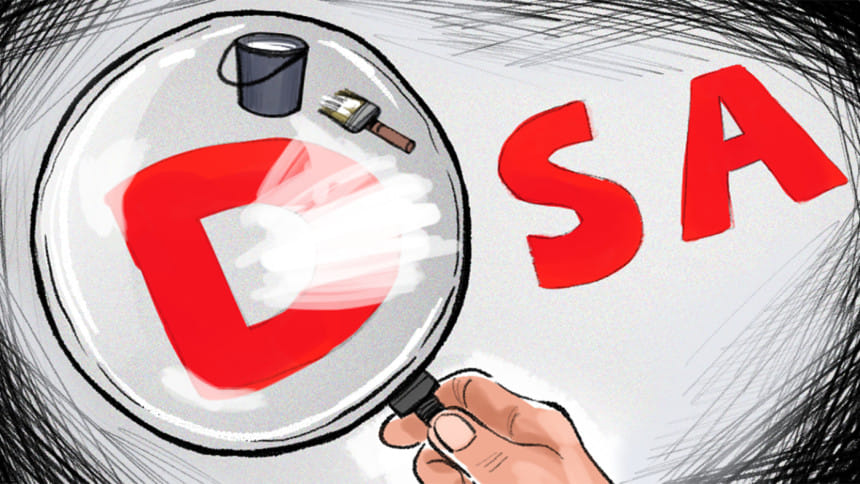
Law Minister Anisul Huq recently stated that he thinks the misuse of the Digital Security Act, 2018 will stop after the enforcement of the proposed Cyber Security Act. He said the problems (that is, some sections of the DSA) which worried the journalist community would be gone, and so the harassment of journalists would also stop. It is supposedly not an "old wine in a new bottle."
However, just a casual look into the draft CSA will prove to anyone that the optimism expressed by the law minister is entirely unfounded.
One of the most prominent critiques of the current DSA came from the Office of the United Nations High Commissioner for Human Rights (OHCHR) in the form of the OHCHR Technical Note to the Government of Bangladesh on review of the Digital Security Act, published last year. In the report, the UN body highlighted three major issues with the DSA. Firstly, the vague and overly broad provisions of the DSA criminalise various legitimate forms of expression with overly harsh sentences. Secondly, the powers granted to the police and the Bangladesh Telecommunications and Regulatory Commission (BTRC) are far too broad. Thirdly, the offences stipulated in the DSA are non-bailable and allow pre-trial detention.
Of course, one has to give credit where it is due. Under the drafted CSA, the significant positive changes include making several non-bailable offences bailable and also cancelling provisions for repeat offenders.
However, the key issues arising from vague provisions and the broad powers of police and the DSA enforcing agency remain totally unaddressed. Therefore, the function of the DSA as a tool for suppressing freedom of speech is entirely untouched by reform.
I would like to focus on a particular part of the CSA, which encapsulates the worst aspect of this problem.
When the ICT Act was replaced with the DSA in 2018, the government repealed Section 57 of the ICT Act, but all its provisions were included in four separate sections of the DSA. Namely, Sections 25, 28, 29, and 31. Of all the cases filed under the ICT Act, 65 percent were under Section 57. Since the DSA came into effect, the number of cases filed under the aforementioned four sections have exceeded 1,500, according to data collected by the Centre for Governance Studies. Almost one-third of all cases filed under the DSA are under Sections 25 and 29, mainly for defamation.
The UN human rights office observed that Section 25 – which criminalises "offensive, false or threatening data information" – and Section 29 – which criminalises "defamatory information" – of the DSA relate to acts considered civil liability issues in many other countries. The OHCHR also noted that these sections "do not include defences, such as the defence of truth or a defence for public interest in the subject matter…"
Simply allowing bail does not address the issue of why and how these two sections are being misused. Instead, by keeping the defamation clauses as a criminal offence subject to a fine of Tk 25 lakh, the process of suppression has been streamlined.
The core problem of these two sections in the DSA is that they are considered "desacato laws," meaning that they are laws which penalise offensive expressions directed at public officials and restrict freedom of expression and the right to information. These two sections are the most misused of the DSA, and are primarily used to target journalists and members of opposition political parties.
In the new CSA, the clauses under Sections 25 and 29 have been untouched. Simply allowing bail does not address the issue of why and how these two sections are being misused. Instead, by keeping the defamation clauses as a criminal offence subject to a fine of Tk 25 lakh, the process of suppression has been streamlined. It has to be understood that Tk 25 lakh is not pocket change for the average Bangladeshi citizen. For many in the middle class, especially those who are young, that amount equals their life savings. By adopting this approach, the police may no longer have to bother tracking down the accused individual, go through the hassle of picking them up and filling out the paperwork. Instead, fines can be easily sent out in mass against a large number of targeted people, who will inevitably fail to pay the exorbitant fine and will later be collected by police whenever it is convenient for the latter.
The OHCHR has repeatedly stated a general view, under international human rights law, that defamation should be decriminalised as it discourages the media from publishing critical information on matters of public interest, thus posing a threat to freedom of expression and access to information of all kinds, and impeding journalists' legitimate work performance. Thus, the OHCHR is concerned that these sections fall short of Article 19(3) of the International Covenant on Civil and Political Rights (ICCPR). Bangladesh has been a party to the ICCPR since September 2000.
Similar to the findings of the OHCHR, an analysis by the Sampadak Parishad (Editors' Council) stated that Section 25 of the DSA directly affects all investigative reporting in the media. Such reports are usually about some irregularities performed by institutions and individuals. Corrupt people might use this law to intimidate journalists and media organisations, and try to prevent the publication of such stories on the pretext that the reports have attacked or intimidated them. Regarding Section 29, they restated that a law already exists to deal with defamation, so a separate law for digital media is unnecessary.
The way to stop the CSA from being used against freedom of speech would be to turn the acts under Sections 25 and 29 into civil liability issues instead of criminal ones. For this, three things have to be ensured. Firstly, the criminal defamation laws have to be replaced with civil laws that are more narrowly defined. Secondly, only the party who is the alleged victim of defamation or harm to reputation should be allowed to file a case against the alleged perpetrator. And lastly, the sections must include defences and exemptions in regards to defamation, such as the defence of truth or a defence for public interest in the subject matter of the criticism.
Zillur Rahman is executive director of the Centre for Governance Studies (CGS) and a television talk show host. His X handle is @zillur

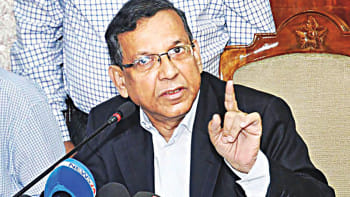
 For all latest news, follow The Daily Star's Google News channel.
For all latest news, follow The Daily Star's Google News channel. 
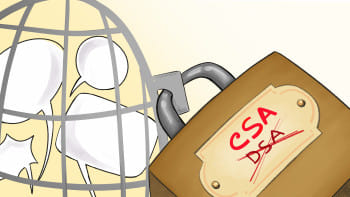

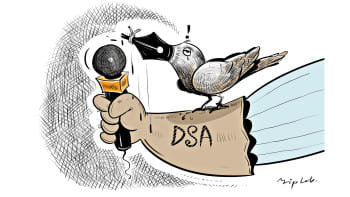




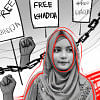
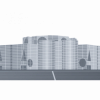



Comments